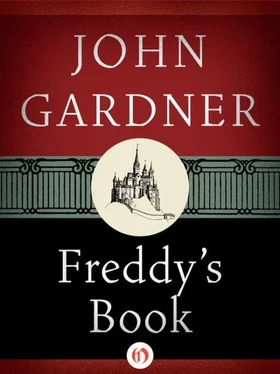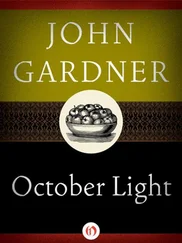Quickly, for fear that he might begin to make threats, King Gustav turned on his heel and hurried away.
1.
BECAUSE IT WOULD BE USELESS to try to flee to Europe, especially for Lars-Goren, who had no friends there, Lars-Goren and the bishop fled north, on the pretext that there, where his home was reputed to be, they were most likely to find the Devil.
It was a bitter trip for Lars-Goren. They followed the same route he had taken in happier times, when King Gustav was newly crowned and full of high hopes and idealistic plans for Sweden. It was almost the same season as when he’d ridden north before, to be united again, for a little, with his family; the summer was just a little farther along — there was fog in the valleys, mornings and evenings, and sometimes, as they passed through open farmland, a sharp smell of autumn. Sometimes tears filled his eyes as he rode, his thoughts dwelling on his wife and children, his household servants, and his peasants. Even the foolish flattering priest whom he’d visited on his last trip and whom he’d known since childhood, Father Karl, who was always trying to advance himself by making up stories of what others had said — even that man Lars-Goren remembered fondly now. “I’ll miss him,” he was saying to himself. For he knew he could hide only so long at his own home castle. Gustav, in his present tyrannical mood, would be sure to hound them. Gustav’s plan might be mad — so Lars-Goren believed it — but the king was perfectly serious about it. After a time, their failure to report success in their struggle with the Devil would turn the king against them, and all the force of his frustration would come down on their heads. It was a strange thing that a king should have such a power — that the people should voluntarily grant him such power — but it was a fact of life, clearly, and had been so for centuries, all over the world. Thus in time Lars-Goren would become a danger to his household by being there; to save them, he would have no choice but to press on, God knew where. His responsibilities would fall to Erik. “God bless him,” Lars-Goren thought. Bishop Brask glanced at him, then tactfully looked away. They rode on, moving toward Uppsala, in silence.
In this cloud of gloomy thoughts, Bishop Brask was something like a lightshaft of relief. He was not a man Lars-Goren greatly liked or even admired, though he was clearly no fool; but he was at least a distraction, a point of interest. For hours at a time he would ride without a word, lost, perhaps, in his own gloomy thoughts. He rode with his back very straight, like a man in pain, or like a prisoner riding with a rope around his neck. He seemed to look neither to left nor right nor off into the distance, but only at his horses ears. His attire was elegant, like a rich lord’s, yet when one looked more closely, as Lars-Goren had ample occasion to do, it was not all it might be: the collars and cuffs had been shrewdly repaired, the cloth stretching over his knees was thin, no more substantial than a fine lady’s hankie. He rode the same horse he’d been riding when Lars-Goren had first met him beside the high mountain lake in Dalarna, the splendid black stallion he called Crusader; but the horse was old now, and though he still habitually fought the bit and sometimes rolled back his eyes, recalcitrant, there was no longer spirit in the horses rebellion; it seemed more crotchety, like the fussing of an old man no longer aware that he’s fussing. He snatched leaves from the branches of trees as he passed, and Bishop Brask, each time, would give a perfunctory little jerk at the reins; but neither of them was any longer interested in the struggle. When they cantered, even for short distances, the bishops horse breathed harshly and took crafty advantages, favoring his forelegs as he came out of jumps, breaking stride for swamp-ground, throwing his head for leverage as they climbed steep hills. As if respectfully, Lars-Goren’s horse Drake held in a little, though Drake, at ten, was at the height of his powers. Crusader was perhaps sixteen. The bishop found excuses, perhaps without knowing it, for moving his horse no faster than he had to, and Lars-Goren, half-unconsciously fell in with this. It was only when he realized that they wouldn’t reach Uppsala until the middle of the night that he saw clearly how slowly they’d been moving, and the reasons. But no matter, he told himself. There might come a time when speed would make a difference, but except for Lars-Goren’s strong wish to see his family, there was no great hurry just yet. At times, as if to distract Lars-Goren from the slowness of the pace, the bishop would look over at him with his milky old eyes and speak. Once he said, “I’ve been interested, watching this hobby of the king’s — breeding livestock. I visited one of the farms, outside Vadstena. He’s a fascinating man, King Gustav. One wonders how much he understands, how much he merely acts.”
Lars-Goren raised his eyebrows, waiting, inviting more. The bishop for a moment sucked his lips inside his teeth, looking down at Crusader’s mane; then he continued: “It may be more important than people think, this business of breeding livestock. It’s been a favorite occupation of kings for centuries, clear back to the Greeks, and as I once mentioned in one of my books — perhaps you’ve read it—‘what kings do for sport will in the end stand the world on its ears.’ Heaven knows what I meant, exactly, but in this case it may well apply.” He nodded thoughtfully, smiling a little, as if the conversation were ended.
“I’m not sure I follow,” Lars-Goren said.
For a moment Brask said nothing, musing in private. “Just this,” he said at last, as if reluctantly, already slipping toward boredom. “If you look at it philosophically — not just at how breeding can produce a particularly meaty strain of pigs or an extra-large bull, not just at how, in the short run, a wolf can be transformed in just a few generations to a domestic hunter … if you look, instead, at the long-term implications. …” He compressed his lips and looked suddenly cross. “The Church, if it were paying attention — which it never does, of course — would be shocked to the soles of its boots by this breeding of livestock.”
They rode awhile in silence, Lars-Goren, for his part, pondering why it was that the bishop had such difficulty bringing himself to put his thoughts into words. It was not for lack of thoughts, Lars-Goren had known that since the first day he’d met him. But words seemed to come from the bishop’s heart as if weighted by field-stones. Even to say, “Good morning,” it seemed the old man had to take a deep breath, overcome inertia.
There was a whir in the grass to the right of them and a flock of partridges flew up, wings roaring. As if the noise and sight had renewed his strength, the bishop asked rhetorically, “What does it suggest, this stock-breeding? It suggests that, given enough time, we could transform the world, change every tree, every flower and insect. Mate the dogs with long noses, generation on generation, and in time you have a species of long-nosed dogs. Is it that that draws kings to the sport of breeding stock? Have they seen to the heart of the mystery? Have they noticed that they’re on to the fundamental secret of God? You look at me in alarm, Lars-Goren, as if you think I’ve gone mad. I haven’t. Nothing like that. But think: suppose it’s the same with ideas, governments, even virtues. Surely it’s that these Kings have guessed, though if you asked them they might not understand it.”
“You’ve lost me,” Lars-Goren said.
“No matter, just an old man’s nonsense,” said the bishop. After a time he said, “Put it this way: We hear the expression ‘Might makes right.’ Suppose it’s true — I mean profoundly true. Suppose there is in fact no good in the world except that which survives. We create a horse stronger than other horses, put him in a field with those lesser horses, and he kills them. They’re dead forever then, unable to throw their line. Suppose it’s the same with governments. Create a form of government more effective than all others, in due time it will destroy or at any rate outlive all the others. What more could any king ask when he dies than to be remembered as the man who created such a government as that?”
Читать дальше











